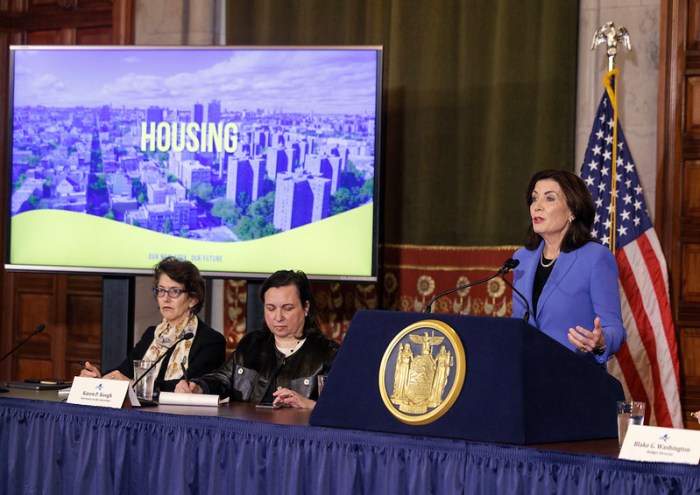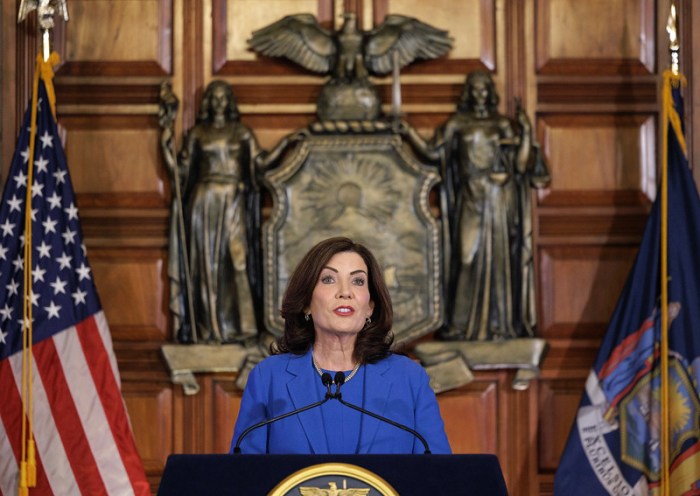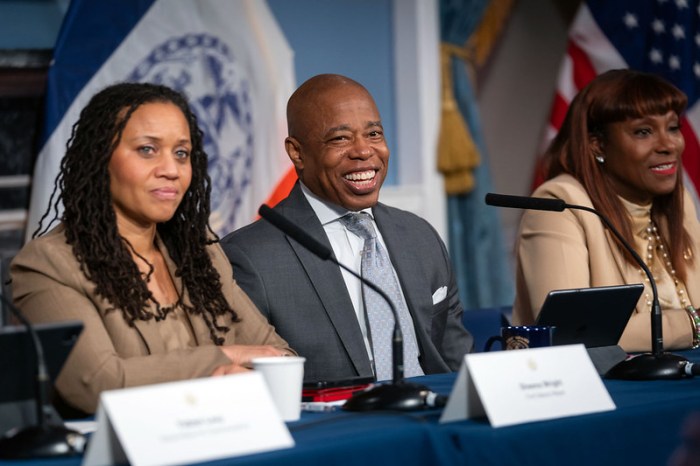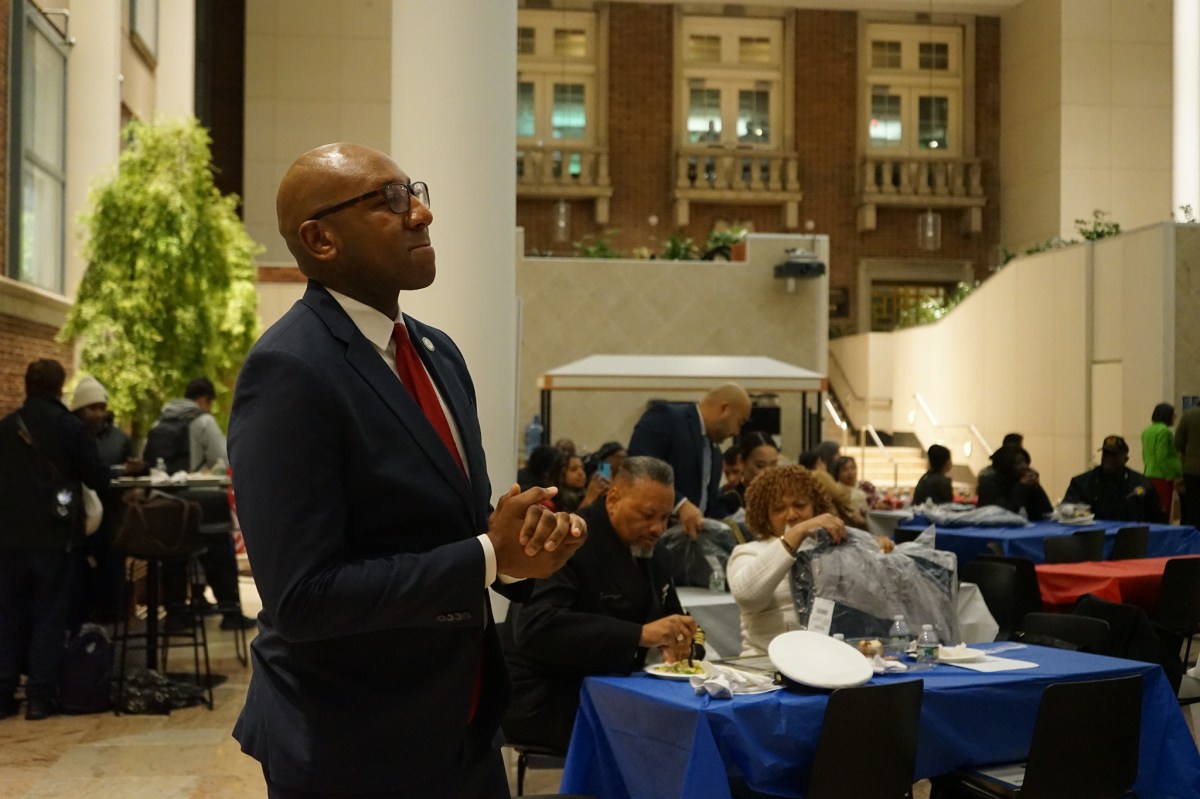Albany lawmakers finally passed the state budget on Saturday, a plan that contained a two-year extension of mayoral control of New York City public schools, a deal to boost housing supply and some tenant safeguards.
Gov. Kathy Hochul took a victory lap Saturday afternoon over the passage of the roughly $237 billion spending plan, which was approved nearly three weeks after its April 1 deadline. It came nearly a week after Hochul announced a “conceptual” budget agreement between herself, state Senate Majority Leader Andrea Stewart-Cousins and Assembly Speaker Carl Heastie last Monday.
Hochul touted the plan’s inclusion of the housing package — something she and state lawmakers failed to agree on last year, as well as new enforcement measures against retail theft and illicit cannabis shops and an extension of mayoral control, also known as mayoral accountability.
“In my State of the State, I promised New Yorkers we’d fight to build more housing, improve education and protect public safety — and that’s exactly what our budget is going to do,” the governor said in a statement. “This budget cracks down on retail theft and gives us new tools to shut down illicit cannabis storefronts. It helps the children of New York City by extending mayoral accountability for public schools. And we got it all done without raising income taxes by a single cent.”
Mayoral control renewed, tweaked
Mayor Eric Adams, who sought an extension of mayoral control as one of his top state budget priorities, said the two-year extension of the policy will allow himself and Schools Chancellor David Banks to continue pursuing their vision for the city’s public school system. He specifically pointed to improving reading and math scores, his implementation of a new phonics-based reading curriculum and the ability to absorb thousands of migrant students as direct results of mayoral control.
“The continuation of mayoral accountability is important to New York City families, students, teachers, and the entire school community, and we thank Governor Hochul, Senate Majority Leader Stewart-Cousins, Assembly Speaker Heastie, and the legislature for delivering for our students and allowing me and Chancellor Banks to continue to provide bold and necessary programs for the betterment of our children,” Adams said in a Saturday statement.
The policy was reportedly reintroduced into budget talks by the governor, after legislative leaders earlier this month said it would be handled outside of the spending plan.
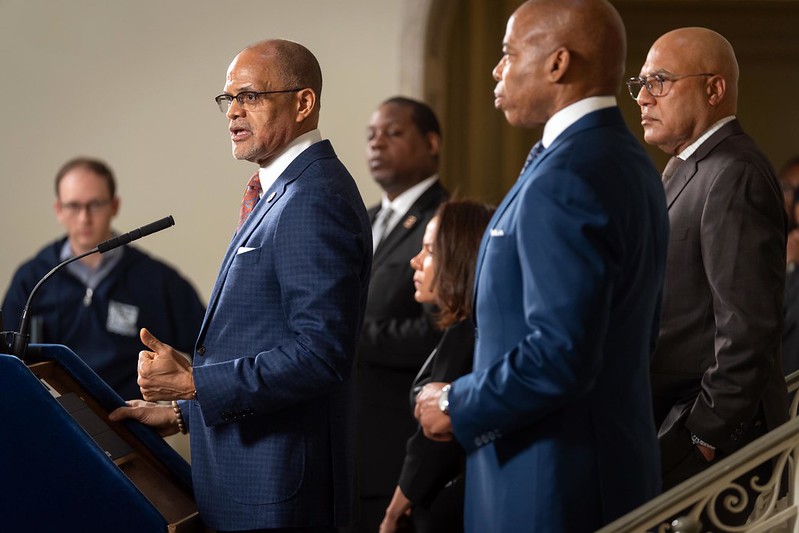
But while Adams got to retain authority over the city’s schools, the two-year extension of the policy fell short of the four years that he and Hochul had been pushing for. Furthermore, the deal came with measures favored by the city’s powerful teachers’ union — the United Federation of Teachers (UFT) — and its allies in Albany.
One provision will grow the city’s Panel for Education Policy (PEP) — an oversight body for its public schools — from 23 to 24 members. The PEP will now have an “independent” chairperson chosen by the mayor from a shortlist provided by the state Senate, Assembly and Board of Regents.
It also requires the city to allocate enough funding in its budget to ensure individual schools can reduce class sizes in accordance with a state law passed in 2022.
State Sen. John Liu, who chairs the upper chamber’s New York City Education Committee, said on the Senate floor Saturday that while he was satisfied with the deal, he would have liked to see mayoral control handled after the budget. He said that would have given lawmakers more time to consider the findings of a state Department of Education report on mayoral control issued earlier this month.
“This was all done relatively last minute, unfortunately,” Liu said. “I think the better process would have been to consider mayoral control and New York City school governance outside of the context of the state budget.”
Controversial housing compromise
When it comes to housing, Hochul and state legislative leaders are patting themselves on the back for reaching a deal to build more units and add some new tenant protections. But tenants advocates and the real estate industry are both unhappy with the final product.
The budget includes an affordable housing tax break for developers to replace the expired 421-a program — dubbed 485-x. It also contains a modified version of “Good Cause Eviction” legislation designed to limit yearly rent increases and narrow the reasons for which landlords can evict tenants.
In order to qualify for 485-x, developers will have to devote at least 20% of the units in a new construction project to tenants making 80% of the area median income. The Real Estate Board of New York is not happy with 485-x, arguing its more stringent affordability requirements will yield less housing overall.
“We are confident that this package falls far short of addressing the city’s housing needs and must be reassessed in the coming years to put the rental housing market on a solid footing,” REBNY President James Whalen said, in a statement last week.
The Good Cause eviction protections, sought by tenant advocates since 2019, give tenants the power to challenge yearly rent increases over 10% or 5% plus the consumer price index — whichever is lower. It will also protect tenants from being evicted in most cases unless they do not pay rent or otherwise violate the terms of their lease.
However, there were several carve outs included in the measure that significantly narrowed who the law applies to compared to the original bill, which would have covered all non-rent regulated tenants statewide. Instead, the program that was passed is opt-in for counties outside the city and exempts buildings constructed since 2009 for 30 years, owner-occupied buildings with 10 units or less, small landlords with portfolios of 10 units or less and units priced at 245% of fair market rent.
The bill also adds reasons for which landlords can evict tenants, like an owner’s so-called “good faith” removal of a unit from the rental market and “good faith” substantial apartment rehabilitation.
Housing advocates charge the exemptions significantly weaken the original bill because it would apply to far fewer tenants and be harder to enforce, due to the difficulty of determining how many units a landlord owns. But the measure does include language requiring buildings owned by businesses like limited liability companies to list the names of their owners in order to get the small landlord exemption.
“Despite hard fought efforts by tenant allies in the legislature to protect renters, Governor Hochul’s Good Cause Eviction is so full of holes that landlords will drive a fleet through it,” said Cea Weaver, coalition leader of Housing Justice for All. “Millions of families around the state will be excluded entirely and few tenants eligible for the protections will be able to exercise their rights.”
Hochul said last week that despite the alterations, tenant advocates should see the deal as a “a win,” given that it offers more protections than are currently in place.
“There’s always controversy. Everybody wants what they think is the perfect deal, but this is so much more than they had,” Hochul said. “I would take that as a win.”
Read more: Libraries Left Out of Adams’ $111B Executive Budget




